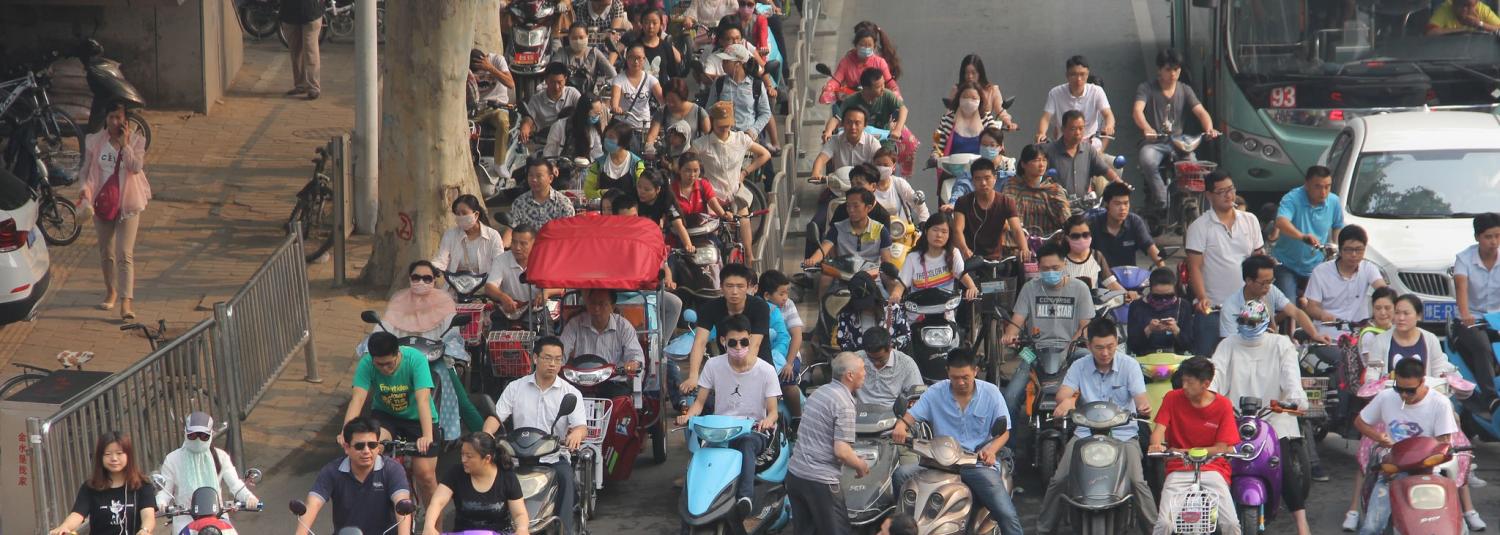Several days ago some very upsetting footage surfaced online of a woman being hit by car in the central Chinese province of Henan. She was ignored by passers-by as she lay injured on the road, and then hit again, this time fatally. The incident - not the first of its kind - has caused a resurgence in the heated debate about values among Chinese people.
The social media reaction has been for the most part angry and upset about the indifference shown to the accident victim by passers-by. Some netizens asked what was wrong with Chinese society. Others, however, raised the issue of ‘scammers’ who fake injury to get compensation.
This morality debate is not new. In 2011, for example, a video was released that showed a two-year old girl, Wang Yue (who came to be known as Little Yue), being hit by a van, and lying injured on the ground. The driver pauses, but does not get out. In a moment he drives on, the rear wheels of the van running over the child. He drives away. The video shows passers-by who first look at the child lying, crying, on the road, and then, giving her a wide berth, walk on. Finally, after seven minutes, a woman stops and takes Little Yue to hospital. The child died from her injuries. The incident, like the more recent event in Henan, triggered soul-searching, shame, and anger among many Chinese.
What these tragic events reflect about Chinese society is not as straightforward as an inhuman lack of empathy or compassion. Rather, they demonstrate a very unfortunate combination of a system of moral obligation in which loyalty is due only to the ‘in-group’ of those closest to you, and a fundamental lack of trust. The result is that altruism has become risky.
The lack of trust has a very real basis. Faking injury for compensation is rare but the existence of even a few cases has had considerable negative impacts on trust, compassion, and moral obligation, as Yan Yunxiang elaborates in his book. While the majority of Weibo users criticised the indifferent bystanders, there is also a small portion of netizens who expressed their worries about "碰瓷" (pèng cí). The phrase 'pèng cí' directly translates as 'touch porcelain' and comes from the antique industry. It originally referred to a practice of some shop-owners who deliberately put porcelain products in the middle of the passageway so that when customers passed, they might accidentally break the goods and the sellers could then claim compensation. In recent years, 'pèng cí' is now commonly used to refer to scammers who fake injury in traffic accidents to get compensation.
Most Chinese people I have spoken to about the matter cite ‘the Nanjing ruling’ of 2006 in which a passer-by stopped to help an injured person, who then accused the passer-by of causing the accident. When taken to court in Nanjing, the judge is famously said to have ruled in favour of the plaintiff, saying that if the passer-by had not been guilty, he would not have stopped to help. The judge then ordered the plaintiff to pay all costs of the injury and the court case (although these costs were later reduced). In another incident in 2011, an elderly man slipped and died from an easily preventable cause, and when the event was first reported on the internet, 29,892 users of Sina.com wrote comments in which almost all said they understood why the onlookers did not help the man, and many admitted that they would have done the same if they were there. Not long after the death of Wang Yue in 2011, pictures of a young girl holding an umbrella over a beggar in a rainstorm were released on the internet. Public discussion included accusations that the girl and the photographer deliberately staged the event for personal status.
Then there is the nature of moral obligation in Chinese society. Rather than being horizontal, where an individual’s obligation to all other members of society is (at least theoretically) equal, in China it follows a pattern of concentric circles, with the self in the centre. The idea that an individual’s moral obligation does not extend equally to all members of society is explored by Chinese sociologist Fei Xiaotong. In his classic text From the Soil, Fei argues that in the 'Chinese system of morality, there is no concept of "love" such as that exists in Christianity – universal love without distinctions', and therefore 'obligation is also differentiated. Fei observes that the path of obligation 'runs from the self to the family, from the family to the state'. Anybody external to an individual’s in-group is considered a stranger, and the behavioural norms and moral values that apply to the in-group are not relevant.
The combination of these two factors is disturbingly influential. After several years of living in Beijing, I found myself in a situation where my reaction shocked me. I was crossing a busy two-lane street, and on the other side an elderly man and woman were arm-in-arm, helping each other to take the step over the gutter and venture onto the street during a gap in the traffic. They made slow progress and, before too long, the woman fell onto the road. Her companion tried to help her up but was not strong enough. Cars were coming around the corner. My first reaction was to run over and help, but I paused, and without consciously realising what I was doing, checked to see if there were witnesses around in case I was accused of causing an accident. It was only a brief moment, but I was amazed at the extent to which I had unwittingly internalised the norms of differentiated obligation and lack of trust.
Morals and values, however, are not fixed. The moral landscape in China, as anywhere, is constantly in flux. What people believe to be acceptable moral behaviour depends on circumstances - what terrorism has done to our concepts of privacy may be one example of moral shift in Western countries. In China, there has been a recent increase in charitable donations and volunteerism, which even five years ago were rare. Where volunteerism did exist, it was often seen as a tool for improving one’s social credibility - it looked good on a CV. This seems to be changing.
Many educated urban Chinese people have said to me that they feel that Chinese society has lost its sense of moral direction. The Chinese Communist Party has tried to fill that void by extending what Fei Xiaotong noted in 1947 as the natural loyalty to the country to include the Party-state. It has, if unevenly and evidently without full consensus among elites, reinserted Confucianism (not considered a religion), after decades of it being anathema to the Party. The placement and then removal of a huge statue of Confucius in Tiananmen Square in 2011 illustrates this point. Many young people now talk about Confucianism being at the heart of Chinese values. Religion, however, remains very much frowned upon as a potential threat to the Party’s control over public narratives of morality and obligation.
It remains to be seen where the moral landscape in China might go from here. I certainly hope the direction it takes in the future involves far fewer of these kinds of incidents. Ideally none.
Thanks to Zixin Wang, an intern with the Lowy Institute's East Asia Program, for research assistance with this post.

